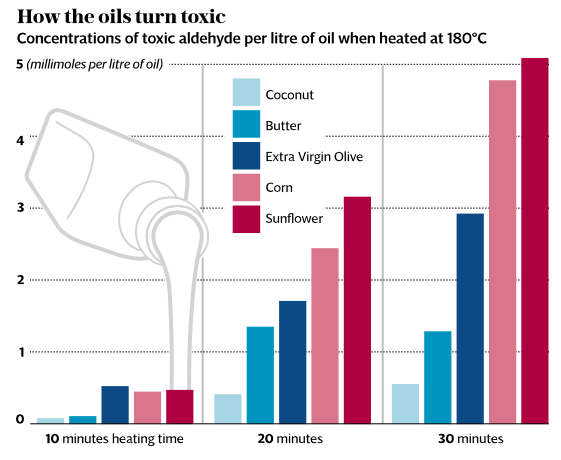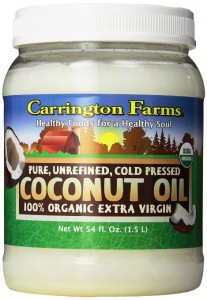Nutrition
Intense food cravings may have a genetic component, as researchers identify two specific gene variants (FTO and DRD2) that are associated with increased brain activation for high-sugar, high-fat foods.
‘Food Quality Matters’ according to new evidence from the American Heart Association. Who found a 13% lower risk of type 2 diabetes in those eating more than 11 meals a week at home, compared to those eating less than 6.
Reduced risk of death via Type 2 diabetes, cardiovascular disease, and mental illness for moderate coffee drinkers (< 5 cups per day). Which is similar to this study from the American Journal of Epidemiology, showing a decrease in mortality with each cup to a sweet spot of 4-5 cups per day:
- 1 cup/day: HR = 0.94
- 2-3 cups/day: HR = 0.82
- 4-5 cups/day: HR = 0.79
- ≥6 cups/day: HR = 0.84
Coconut oil re-iterates its usefulness as an anti-fungal agent in this study from Tufts University, where it prevented the overgrowth of Candida (a common pathogen) in the gut.
More evidence that animal protein is the one food you can significantly over-eat without seeing negative effects on your body composition. In this study, from the Journal of the International Society of Sports Nutrition, the group eating 3.4g/kg/day lost more body fat than the group eating 2.3g/kg.
Full-fat dairy consumption is ‘inversely’ associated with the metabolic syndrome, while it’s low-fat counterpart is NOT!
Take a look at where your sea salt comes from, as it seems the stuff from China is full of plastic.
Heating polyunsaturated oils (PUFAs) releases high levels of aldehydes, that are linked to cancer, heart disease and dementia. If you’re a regular on here, this is something you should be well aware of by now. Saturated = Good, Unsaturated = Bad.

While we’re on the topic, new research from Advances in Nutrition shows that Americans have 136% more lineolic acid (LA) in adipose tissue than they did 50 years ago. A result DIRECTLY related to the overconsumption of soybean oil, corn oil, and other polyunsaturated additives.
Garlic won’t help you make friends, but it is yours! With this study from the Journal Nutrition demonstrating that a garlic containing meal (5g) can activate genes that boost immunity.
Fitness
Muscle and strength loss is STILL associated with an increased risk of falls and fractures. And as discussed in 1% Fitness, this is generally what initiates the drastic decline in health.
Low-impact exercise helped seniors with arthritis and other musculoskeletal problems drastically improve their functional abilities. With the 204 (mostly female) participants posting these results after only 8 weeks:
- 88% more participants could climb several flights of stairs
- 66% more participants could lift/carry groceries
- 63% more participants could bend, kneel, or stoop
- 91% of participants felt the program reduced their fatigue
- 97% of participants felt that the program reduced their stiffness
- 95% of participants felt their balance improved
- 96% of participants felt more confident that exercising would not make their symptoms worse
Going barefoot improves balance and posture, and prevents common lower-limb injuries (shin splints, plantar fasciitis, stress fractures, bursitis, and achilles tendonitis) according to Patrick McKeon, a researcher from Ithaca College. Who says we need to focus on strengthening our ‘foot core’ just as much our actual core.
Walking ‘fasted’ is great for burning fat. We shouldn’t be exercising to ‘burn,’ but a little stroll before breakfast doesn’t hurt.
Vigorous exercise may have a protective effect against prostate cancer, according to new evidence from the National Cancer Institute. The researchers analyzed data from over 60,000 men across approximately 20 years and identified a 34% decreased risk.
12 week walking routine (30min 3-4x Week) slows cortical (brain) shrinking associated with Alzheimer’s disease in previously ‘inactive’ 61-88 year old participants.
Lifestyle
Chronic sitting negatively affects the health of those recovering from a cardiovascular event, even if they are exercising. Which adds to the evidence that “you can’t out-exercise a crappy desk-job!”
Even pregnant women may have to stay conscious of ‘chronic’ sitting time. As this study found higher rates of gestational diabetes, greater weight gain and depressive symptoms in 1,263 pregnant women monitored at the University of Warwick.
Lower levels of obesity for those standing more during the day. With women standing for a ¼ of the day looking at a 35% reduced likelihood of obesity, and men standing for ½ looking at 59%. Did you get that stand-up desk yet?
Unfortunately, sit-to-stand workstations may be increasing sedentary time outside of work (compensation effect); BUT total sitting time over the course of the day was still reduced. Either way, this is something we should all be conscious of – don’t skip the dog walk because you stood at work!
Research from the American Heart Association makes a case for swapping your car for a bus pass. Finding that public transportation users were 44% less likely to be overweight, 27% less likely to have high blood pressure, and 34% less likely to have diabetes. Perhaps because they walk more (home or work to bus-stop) and stress less (no stress)? Extra time to relax and clear their mind, or read a book?
All tablet and e-reading devices emit blue light that disrupts sleep. But orange-tinted glasses and light-cancelling apps help.
New findings in the journal Hormones and Behavior suggest that ‘the family man’ has lower testosterone levels than his single, or less emotionally supported, counterparts. Perhaps getting married really did soften you up?
Health & Longevity
Research from Oregan State University shows us how insulin resistance affects more than just your waistline. As their study found extremely poor absorption rates of fat-soluble vitamins (specifically vitamin E), even when ingested with fat.
We already know that children who grow up on a farm usually end up with a stronger immune system, and it appears to be the same for children with dogs. Who, compared to their non-pet owning counterparts, exhibit a 15% lower risk of developing asthma; according to this epidemiological study (not the gold-standard) from Sweden.
Inflammation is associated with nearly every disease, and it’s largely to blame for the degeneration that occurs with aging. Despite being an experiment on mice, and despite using unnatural methods to block a specific enzyme, this study shows us the impact preventing and reducing inflammation can have on your healthspan.
High zonulin levels and a shift in gut microbes were associated with chronic inflammation and endothelial dysfunction in those with type 2 diabetes and chronic kidney disease (CKD). Sounds like a huge mess I know, but things start to clear up when you understand that zonulin is stimulated by gliadin (wheat protein) and the researchers also saw high levels of lipopolysaccharide (LPS). Pass the grains?
Obese individuals DON’T have stronger bones, as is commonly thought. Researchers in the Journal Metabolism found weak and deteriorating bone in rats with insulin resistance, type 2 diabetes, and obesity compared to healthy controls. The bright spot being, exercise improved bone strength for both groups.
Carrying excess fat early in life significantly increases your risk of cardiac death in the future, according to this 32-year study on 72,000 women published in JACC.
The cure for knee pain is here, but it doesn’t come in a pill! The Radiological Society of North America has shown that cartilage degeneration (osteoarthritis) in the knees is significantly reduced following weight loss.
Researchers in Zurich have identified a gene called ‘bcat-1’ that can extend the lifespan of nematodes by 25% when blocked. Sounds a little boring until you understand that bcat-1 is responsible for degrading branched-chain amino acids (BCAAs); also known as the ‘building blocks of muscle’ and the ‘reason we eat protein.’ Providing reassurance that avoiding muscle loss is critical to a long and healthy life.
Medication & Supplementation
Vitamin D supplementation (at 2000IUs) improved exercise performance in a group of 13 cyclists, by helping reduce cortisol. The researchers also discussed its impact on lowering blood pressure, as less cortisol means less arterial restriction and blood vessel narrowing.
Higher vitamin D supplementation is also necessary for bone health, according to this study from the Journal of Nutrition. With extra special consideration in the winter months, ESPECIALLY for those beyond the 40th latitude.
New research suggests that the bacteria in our gastrointestinal tract are heavily involved in regulating glutathione, an extremely important antioxidant. The study was done on mice, but it was able to demonstrate that our gut bugs consume the amino acid glycine that is required for glutathione synthesis. Low flora = low glycine = low glutathione.
Chondroitin (found in Bone Broth) proved better than the commonly prescribed Celbrex for treating Osteoarthritis in this study.
Magnesium supplementation may help suppress the amyloid plaques associated with Alzheimer’s disease and cognitive decline. The experiment, published in the FASEB Journal, was performed on mice, but lets hope it transfers to humans.
Stay Lean!
Coach Mike
RELATED ARTICLES:
The 20+ Muscles You're Forgetting
Eat More Meat, Burn More Fat. Period!




